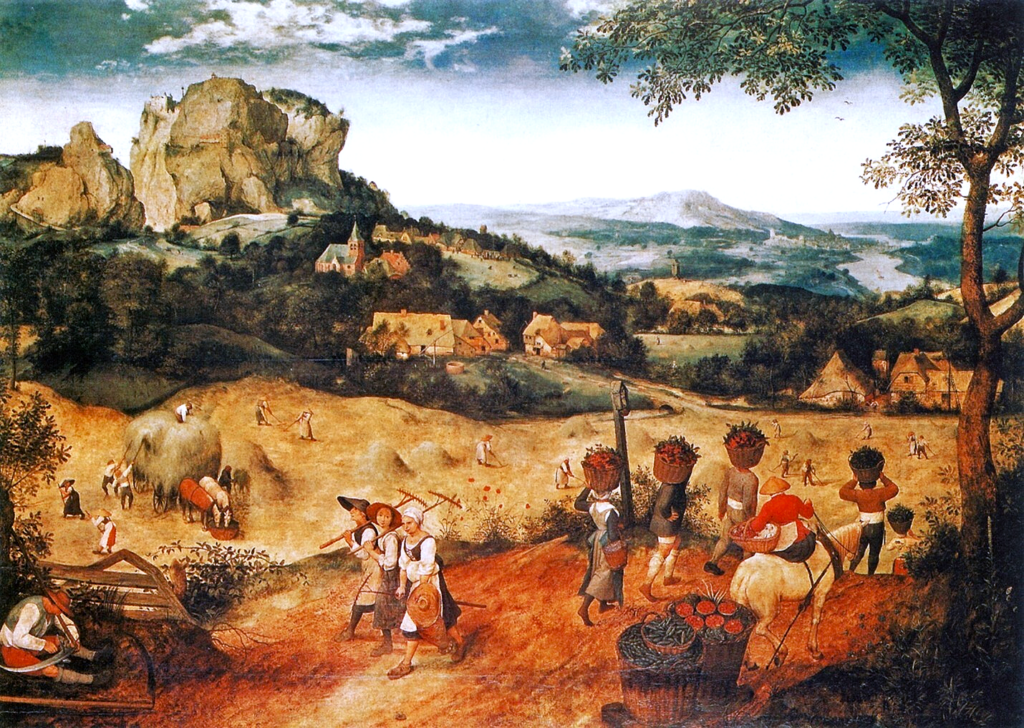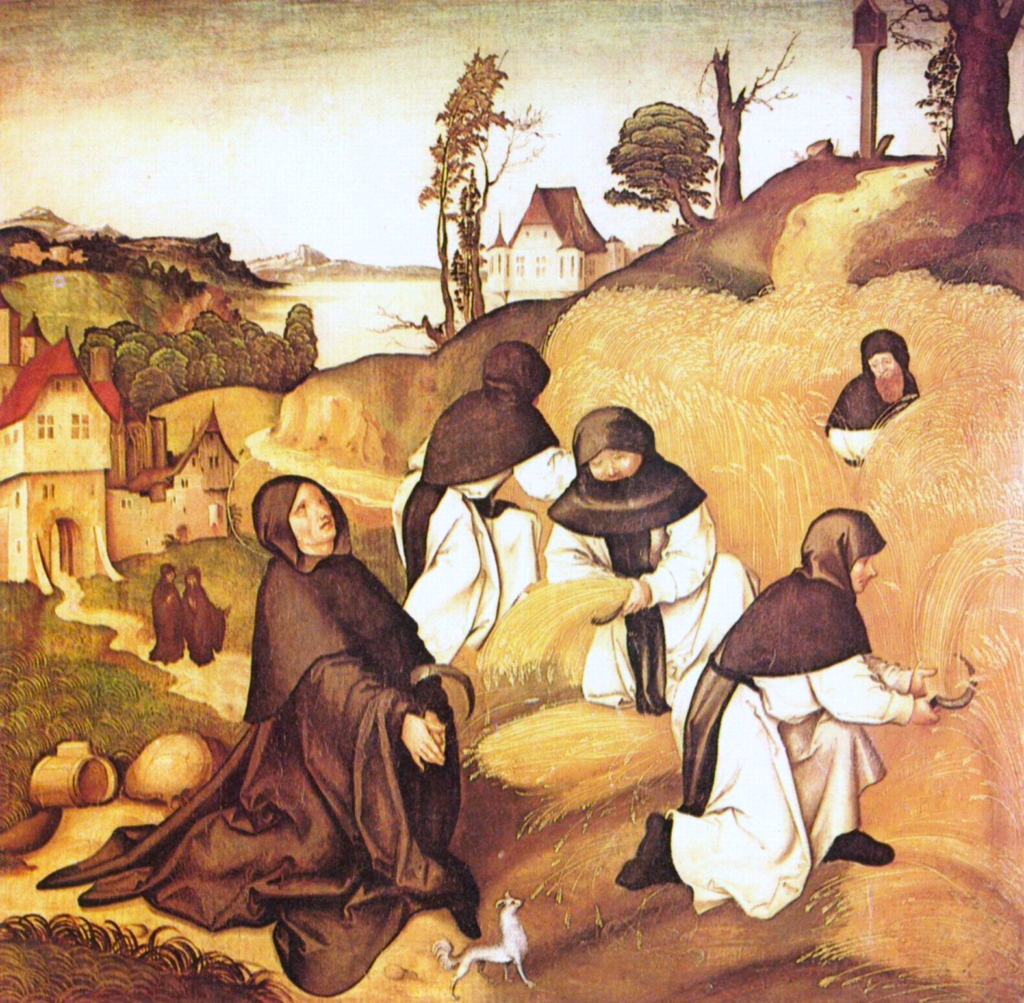Translation of the Gospel According to St. Matthew
At that time Jesus spoke this parable to the multitudes: The kingdom of heaven is likened to a man that sowed good seed in his field. But while men were asleep, his enemy came and oversowed cockle among the wheat, and went his way. And when the blade was sprung up and had brought forth fruit, then appeared also the cockle. And the servants of the good man of the house coming, said to him: Sir, didst thou not sow good seed in thy field? Whence then hath it cockle? And he said to them: An enemy hath done this. And the servants said to him: Wilt thou that we go and gather it up? And he said: No, lest perhaps, gathering up the cockle, you root up the wheat also together with it. Suffer both to grow until the harvest, and in the time of the harvest I will say to the reapers: Gather up first the cockle and bind it into bundles to burn, but the wheat gather ye into my barn.
A Message From St. Pope John Paul II’s Address of his holiness John Paul II to the Members of the Antilles Episcopal Conference, May 5th, 1990.
(emphasis in original)
In the Gospel, we find parables that compare God’s action in the world to the working of nature. His kingdom is like a seed planted in the ground (cfr. Matt 13:24-30). If properly nurtured and cared for, it yields a rich harvest; if neglected or trampled on, it fails to bear fruit. This law of life and growth applies to the whole Body of Christ and to each of its members. The working of the Holy Spirit in our midst is powerful, but it unfolds with the cooperation of human beings who, like Mary at the Annunciation, consent to be servants of God’s saving action. Assisted by the Spirit, Christians engage in a constant struggle to turn away from sin and believe in the Gospel, to grow in holiness by an ever more perfect gift of self, to live in faith, hope and love as signs of salvation for others. The good seed is known by fruits that are patiently cultivated and harvested over a lifetime.
As Christ’s Bride, the Church gives spiritual birth to God’s people through the power of the Holy Spirit. She nourishes her sons and daughters with the sacraments and preaches the word of Truth so that they may truly be free (cfr. John 8:31-32). She is always seeking to deepen and strengthen the gift of faith which they have received, so that they may transform the world through Christian living.
…
How does one prepare God’s people to live a Christian life and to evangelize? In taking up their Christian duties in the world, people need to grasp the contents of that faith. In the words of Saint Peter, they must be able to make a defence to any one who calls them to account for the hope that is in them (1 Pet 3:15). This is essential at a time when various sects, sometimes using unworthy means, are disturbing Catholics in their beliefs, especially when their instruction in the faith is limited. Sound formation, imparted with trust in divine grace and with fidelity to Christ and the Gospel, ensures that the Church’s faith will be safeguarded, strengthened and extended.
Some aspects of this formation deserve special mention. For example, great importance must be attached to the mystery of ecclesial communion in and through the Diocesan Bishop and with the Bishop of Rome, the Successor of Peter. Only within the perspective of communio can the authentic goals of Christian ecumenism and dialogue with people of other religions be properly understood and pursued with honesty and seriousness, avoiding gestures that fail to address real differences. Nor may we forget the role of the Church’s social teaching in the formation process. As the peoples of the [the world] seek a more just and peaceful society, Catholics can turn to a body of teaching which offers an inspiring and challenging vision of authentic human development, of the value of work, and of the dignity and rights of every person.
Formation in the faith must be rooted in personal prayer and in the sacraments, especially the Eucharist, the source and summit of all Christian life (Lumen Gentium, 11). Without this wellspring, spiritual growth is stunted and fails to flower in holiness as it should. For the Eucharist to be received worthily, attention must be given to the Sacrament of Penance (cfr. Redemptor Hominis, 20). Catechesis on the intimate relationship of these two sacraments is properly given when in childhood First Confession precedes First Communion. The reluctance people sometimes feel to confess their sins poses a special challenge for the renewal of this sacrament in our day, but it is a challenge that the Church cannot ignore if she wishes her members to be reconciled with God in the way which Christ has established as a great gift and sacred trust: Receive the Holy Spirit. Whose sins you shall forgive, they are forgiven; whose sins you shall retain, they are retained (John 20:22-23).
Marriage and family life are also a concern of yours which I share, especially with regard to non-sacramental unions among some of your faithful. If the grace of the sacrament is lacking, then the “domestic Church” of the family is not established as it should be. The union of husband and wife “in the Lord” establishes a home in which the fundamentals of Christian living can be fully lived and shared. It is within this “cradle” of human life and love that people learn the true meaning of freedom and responsibility, and are thus prepared to hear and to embrace God’s call to serve others through a particular vocation. [People must be contined to be challenged] to live in accordance with Christian teaching about these most fundamental of human relationships. [Catholics must be encouraged] to establish programmes designed to strengthen marriage and the family…
[Pastors should be] concerned about the spiritual well-being of young people. They too must be awakened and prepared for an evangelizing mission in the Church and the world. [May the] tradition of Catholic education… continue, so that new generations of Catholics will receive a solid foundation on which to build their lives in accordance with the Gospel. And may those outside the Catholic schools and universities likewise find ecclesial instruction and support for a life of Christian faith and virtue.
Knowledge of the faith, sacramental life, a sense of mission: these are fundamental aspects of the formation of the laity. But for these goals to be realized, attention must also be given to the number and quality of priests who under the authority of the Bishop sanctify and govern that portion of the Lord’s flock assigned to them (Lumen Gentium, 28), and to the men and women religious who, through their special consecration, strive for the perfection of charity in the service of God’s Kingdom (Codex Iuris Canonici, 573). Priests and Religious not only remind the laity of their mission but also assist in their formation and encourage them in their role in the Church and the world.
… We also pray that God will grant a still further increase [in vocations of zealoous priests and religious], especially in vocations to the monastic life…
If the increase of vocations to the priesthood is to be truly fruitful for the Church, the seed of the divine call must be nurtured with great love and care… Formation is first of all a work of the Holy Spirit, but it takes place within a human context which must be provided for with all wisdom and prudence.



